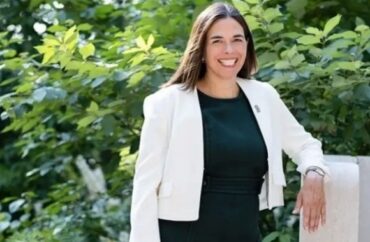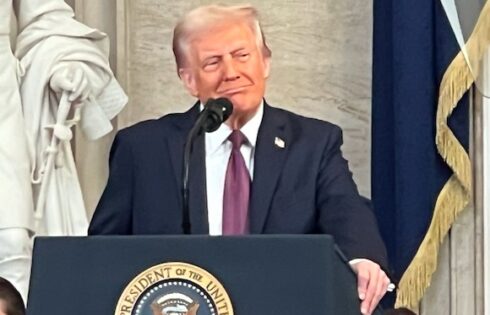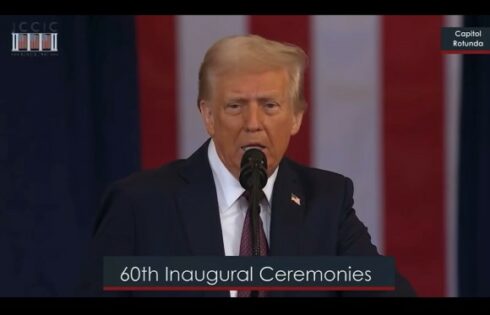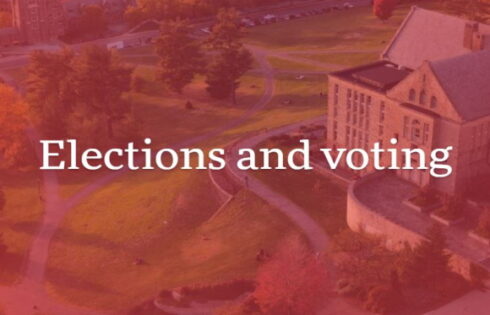
Move comes after school’s poor free speech ranking, speakers disinvited
Dartmouth College’s new president unveiled a project to encourage healthy, free discourse in her inaugural address this fall after the New Hampshire school received a poor rating in a prominent free speech report.
In her Sep. 30 speech, President Sian Leah Beilock said the new Dartmouth Dialogue Project will “teach the skill of open, honest and respectful communication” in and out of the classroom.
“I want our campus to be a place where every member of our community not only feels comfortable expressing unpopular views, but in questioning others who hold views they disagree with,” Beilock said. “The best solutions are developed when a diversity of perspectives are brought to the table.”
The college has faced criticism for failing to protect students’ free speech, and the Foundation for Individual Rights and Expression recently ranked Dartmouth in the bottom 10 in its annual College Free Speech Rankings report.
FIRE Director of Polling and Analytics Sean Stevens told The College Fix that Beilock’s speech and the new project are encouraging signs.
Her inaugural address communicated “to students that the administration is likely to defend free speech during a controversy,” Stevens said.
Ultimately, “giving a speech with a strong message endorsing freedom of speech and the need for diverse perspectives to engage in conversations is great, but the proof is in actions, not words,” he said.
“The decisions administrators and other school leaders make in response to campus speech controversies are likely to have a more lasting influence on an individual school’s climate for free expression than its policies or its students’ perceptions of ‘Administrative Support,’” Stevens said.
In Beilock’s opening remarks, she recognized the importance of free speech on campus because “true potential” is determined by “how well we work together, and how freely we express and capitalize on our differences.”
In an Aug. 30 interview with the campus newspaper, The Dartmouth, Beilock also expressed a belief “in making sure that we have different kinds of people, with different beliefs and views on campus.”
She said the new dialogue project, overseen by Dean of the Faculty of Arts & Sciences Elizabeth Smith, will promote free discourse by aiding “faculty in teaching controversial topics in their courses” and improve students’ conversational skills.
Efforts to encourage participation already are underway. Dartmouth recently advertised paid positions for undergraduates to create videos for the project that teach freshmen about “the mindset and skills necessary to engage in successful dialogue, even in the face of the most emotionally or politically charged disagreements,” according to the job description.
The College Fix contacted Dartmouth’s Communications Office and the Dean of the Faculty of Arts and Sciences twice within the past two weeks, but did not receive a response. The Fix asked for information about the dialogue project and its reception, as well as the college’s response to its poor free speech rating from FIRE.
Dartmouth’s actions regarding free speech have raised concerns in recent years. In 2022, FIRE criticized the college’s withdrawal of invitations to conservative speakers Andy Ngo and Gabe Nandales.
Stevens said a “reference was made to ‘security threats’” when the college revoked the invitations, but “open record requests to the local Hanover Police Department revealed that administrators unilaterally moved the event online despite no evidence of serious threats to disrupt campus.”
The Fix contacted the Dartmouth College Republicans club, which had invited Nandales and Ngo, to ask about Beilock’s speech, the new project and the college’s free speech rank. The club did not respond to two requests for comment this week.
On FIRE’s website, Dartmouth students have expressed concerns about political polarization and a climate where controversial views are silenced.
One individual noted that “there is no room” at Dartmouth “for anything that doesn’t fall into the ‘hyperliberal’ category and people are not willing to see or understand other people’s perspectives.” Another student said they avoided participating in class discussions “for fear of getting canceled.”
When asked about ways the college could improve, Stevens told The Fix that Dartmouth can start with its speech code policies, which currently have a “yellow light” rating from FIRE.
Stevens said there are four policies that contributed to its poor rank: “nondiscrimination,” “sexual and gender-based misconduct,” “student affairs” and “standards of conduct.”
He said revising these speech code policies to “more strongly protect free speech is not a difficult thing to do.”
Several other colleges also have been taking steps to improve free speech on campus, Stevens told The Fix. He said presidents from 13 universities recently “signed onto a campaign to bolster free speech on their campuses.”
Additionally, he said there are “a handful of schools who have committed to a ‘free speech year’ (UC Irvine, Cornell, U of Pittsburgh), and Iowa State recently announced that a little over a third of all incoming students completed summer free speech training.”
While these are positive signs, Stevens said he will wait to “see what happens on each of these campuses over the next few years” before feeling hopeful.
He said FIRE’s free speech report is helpful to track universities’ actions, because it allows people to see if the new efforts at Dartmouth and other schools will “improve their overall score and ranking” in the future.
MORE: Dartmouth shut down my campus event featuring Andy Ngo — then blamed me for it
IMAGE: Dartmouth College
Like The College Fix on Facebook / Follow us on Twitter






Please join the conversation about our stories on Facebook, Twitter, Instagram, Reddit, MeWe, Rumble, Gab, Minds and Gettr.